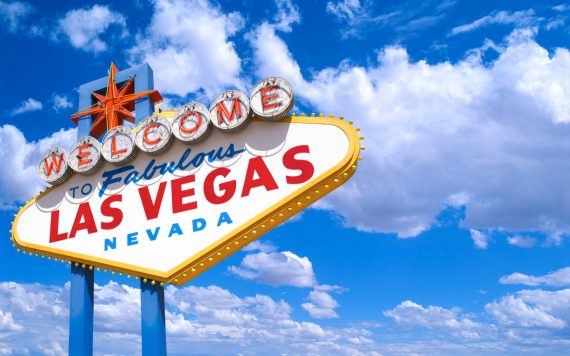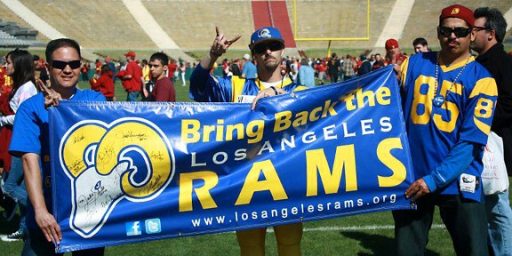Oakland Raiders Set To Move To Las Vegas
The Oakland Los Angeles Oakland Raiders are headed to Vegas, baby!
Yesterday, team owners in the National Football League approved a plan to move the Oakland Raiders to Las Vegas by 2019:
The N.F.L. gave its approval on Monday for the Oakland Raiders to move to Las Vegas, casting aside decades of fears that putting a team in the gambling capital would corrupt the sport, while sending the team to a new and growing market but one that is far smaller.
The team owners, meeting in Phoenix, voted overwhelmingly, 31-1, persuaded that having a team in Las Vegas would allow the league to capitalize on the city’s booming tourist trade and image of excitement, and on its willingness to contribute hundreds of millions of dollars toward the construction of a new stadium.
For years, major leagues steered clear of Las Vegas because some owners worried that putting a team there would lead more players and referees to rub elbows with unsavory characters from the gambling world trying to influence games. But such attitudes have faded with the growth and acceptance of gambling around the country, and with the city’s reduced reliance on revenue from its many casinos.
The N.H.L. agreed last year to create a team in Las Vegas, the Golden Knights, that will begin play this year.
The Raiders, known for a passionate fan base that delights in a rough-hewed image, are likely to begin playing in Las Vegas as soon as 2019, in temporary quarters, with the lease at their current stadium expiring after the 2018 season. In 2020, they are expected to move into a nearly $2 billion stadium, with $750 million in public financing, an arrangement that helped attract the league’s interest. The rest of the money was expected to come from a $600 million loan from Bank of America to the team, $200 million from the league and revenue from naming rights and other deals.
“We know that some fans will be disappointed and even angry,” said Mark Davis, the Raiders’ principal owner. “But we hope they do not direct that frustration to the players, coaches and staff.”
Libby Schaaf, the mayor of Oakland, said that losing the team would tear at the city’s psyche and pride, and that the league would regret its decision.
“The Raider nation is the last of the blue-collar, salt-of-the-earth fan bases, and it absolutely breaks my heart to lose this team,” she said.
The team will become the first to leave its home city, return and then leave again. The Raiders are also the third N.F.L. team to move, or announce a move, in a little more than a year, ending a period of turmoil in which the owners agreed to abandon longtime N.F.L. cities that were unable to appease the owners’ desire for bigger markets and more public financing for new stadiums.
Last year, the Rams left St. Louis for Los Angeles, and then the Chargers announced that they would leave San Diego to move in with the Rams, starting in the fall.
Davis said repeatedly that he was frustrated with the efforts by lawmakers in California to replace the team’s current home, Oakland-Alameda County Coliseum, one of the oldest stadiums in the league.
Unlike the Rams and the Chargers, who left immediately for their new homes, the Raiders will remain in Oakland for at least two more seasons while their new home is built, creating the specter of awkward lame-duck seasons. Davis said the team would continue to be called the Oakland Raiders during that time.
Only Stephen M. Ross, the owner of the Miami Dolphins, voted against the deal. He said in a statement after the vote that not all the options to stay in Oakland had been exhausted. Other owners voted reluctantly for the move because, they said, the league would be leaving the sixth-biggest television market in the country for the 40th-largest. Oakland is also in the booming San Francisco Bay Area, home to some of the wealthiest fans and sponsors in the country.
(…)
The league owners preferred the certainty of a substantial amount of tax dollars for a stadium over uncertain prospects for the team in Oakland, where Ms. Schaaf said often that her city could not afford to pay for the construction of a new stadium. She suggested it could provide the land and infrastructure improvements, and said she was working with Fortress Investments to secure construction financing. Yet in a letter he sent to the mayor last week, Commissioner Roger Goodell said that was not enough, all but sealing the team’s fate.
While the league’s stance on Las Vegas has softened, it continues to uphold rules that prevent owners from holding stakes in gambling operations. That was a big reason that Davis ended his dalliance with Sheldon Adelson, the chairman of the Las Vegas Sands Corp., who offered to pay for part of a new stadium in Las Vegas.
The Raiders will be the second major team to go to Las Vegas, after the N.H.L. team, and there has been talk of Major League Baseball, M.L.S. and the N.B.A. moving to Las Vegas as well.
The moves by the Rams, the Chargers and the Raiders ended a long period of relative stability. They were the first franchises to move in the league since the mid-1990s, when the Browns moved to Baltimore, the Rams to St. Louis and the Oilers to Tennessee.
The decision to let the teams move has been wrenching and filled with vitriol. Lawmakers in St. Louis approved funding for a new stadium for the Rams, yet the N.F.L. owners rejected their efforts in favor of a proposal by the Rams’ owner, E. Stanley Kroenke, to pay for a $2.6 billion stadium in Inglewood, Calif., south of downtown Los Angeles.
After trying for years to get a new stadium in San Diego, the Chargers applied to move to Los Angeles in 2015. When the owners chose the Rams instead, the Chargers did an about-face and backed a referendum that would have provided hundreds of millions of dollars for a stadium in downtown San Diego. Voters soundly rejected the proposal.
The Raiders, though, have a much wider following, in Oakland and across the nation. The team got its start as a charter member of the American Football League in 1960, then went to the N.F.L. when the leagues merged in 1970. After two Super Bowl victories in Oakland, the team owner Al Davis defied the other owners and moved to Los Angeles for the 1982 season, only to return to Oakland in 1995 after the city agreed to expand the Coliseum for him.
As noted, the move to Las Vegas does not come without controversy. Given the cities deep ties to the gambling industry, there are obvious concerns that moving major sports teams into the area could pose problems for the integrity of the sport, as well as proving to be a tempting distracting for players and visiting fans. Additionally, the fact that Las Vegas is a smaller market than the Bay Area has long been cited as a reason to oppose a move given the importance of television ratings to the financial success of the league as a whole. At the same time, though, the team’s dealings with the city of Oakland and Alameda County regarding the construction and financing of a new stadium, which has become a bigger issue for Raiders ownership ever since the San Francisco 49ers moved to a new state of the art stadium in the suburbs. This is especially given the fact that the local governments are reportedly working with the Oakland Athletics on their own request for a new stadium and apparently suggesting that the Raiders could play there, leaving them as the only remaining N.F.L. franchise to share a stadium with a Major League Baseball team, a phenomenon that was comment in the 1960s and 1970s but which has since fallen out of favor since a combined baseball/football venue usually ends up being an impractical inconvenience for both teams. There was some talk in the past of the Raiders sharing a stadium with the 49ers in the same way that the Jets and Giants share Met Life Stadium and the Rams and Chargers will be sharing a stadium in Los Angeles in near future. That appears to be out of the question at this point due to the fact that the 49ers no longer appear to support the idea.
With the N.H.L. and N.F.L. set to move to Vegas, the idea of other professional leagues moving or establishing teams there only seems to be an inevitability. As the article above notes, there have been discussions about the National Basketball Association either moving or establishing a team in Vegas in the near future, and Vegas has been on Major League Baseball’s list for some time now. Of these two leagues, though, it strikes me that the most resistance is likely to come with the idea of moving and MLB team into the nation’s sports gambling capital. Betting on baseball has been a cardinal sin for major league players and personnel since the Black Sox Scandal in 1919 and remains the reason that one of the game’s most legendary players is still banned from baseball and from the Hall of Fame. Moving a team to Las Vegas may be viewed by some baseball owners as coming too close to tempting fate. Additionally, the fact that Las Vegas in the summer is hardly a favorable venue for baseball would mean that any team that moved there would likely require a domed, air-conditioned stadium, something obviously more expensive than a regular stadium. At the same time, though, Las Vegas already hosts the Las Vegas 51s, a minor league team that is currently the Triple-A affiliate of the New York Mets, so the addition of a Major League team may not be as big an adjustment as it seems.
In any case, it would appear that the Raiders are on the move again and that Las Vegas is on the verge of becoming a sports town. How that experiment turns out is something only time will tell.







We have the New England Patriots…and the NY Giants and Jets playing in New Jersey…maybe they could be called the Southwest Raiders?
I’m actually surprised that the Arizona Cardinals didn’t object to the move given that it arguably will cut into their media market to at least some extent.
$750M in tax money transferred to the wealthy. Will anyone ever learn?
I forgot who did the analysis, but a bunch of economists got together and looked at exactly how much a town in fact gained overall when they did one of these stadium + tax breaks deals to entice a sports team to make it the main base. Turns out the ROI for all the cases they looked at was negative.
By 2025 there will be no NFL team in Los Angeles again.
By 2030, there will be no NFL team in Las Vegas.
$750 Million in public money in a town filled with Billionaires. Steve Wynn, Sheldon Adelson, Susan Walton, and Frank & Lorenzo Fertitta could have each invested $150 Million easily to cover the costs. Instead, $750 million gets passed through to the Taxpayers – most who won’t ever be able to afford a ticket to see a game with their families.
@grumpy realist: For example, the Astrodome in Houston opened to the public in 1965 and closed in 2008. The original construction cost was $35 million.
It is owned by Harris County. Harris County taxpayers have consistently voted down any referenda designed to issue new bonds to renovate the stadium since the stadium was closed, and the County refuses to budget the money to demolish it.
The taxpayers of Harris County still owe about $6 million to bondholders for a 40 year old stadium that has sat unused for close to a decade.
@Scott:
From a state that recently cut $14 million out of the education budget, no less. At some point, we’re going to need an interstate compact to stop giving money to sports franchises. Part of it is that politicians love to peddle influence. But part of it is a prisoner’s dilemma — everyone fearing they will lose their team if they don’t make an economically poor “investment” in a stadium.
I am deeply skeptical that a sports team can succeed in Las Vegas. There’s simply too much competition for the entertainment dollar.
LOL
The NFL’s integrity is much like this knight’s honor, methinks.
It’s worth noting that the Raiders are (potentially) getting a $750M tax subsidy from Las Vegas, while Ross privately financed $400M of improvements to his Miami stadium.
For Ross, the 31-1 vote was an easy ‘screw you’ to the NFL, it cost him nothing to vote against the move. To be fair to Ross, Vegas is the 40th largest media market in the United States while the Bay Area is a premium market, so Ross might have saying in effect, “are you guys sure you want to approve moving a team to a smaller market like Vegas?”
@EddieInCA: See? You understand what’s going on perfectly!
@Hal_10000: No, no, no, mes enfants! This is a valuable infrastructure that’s going to be sooooooooo profitable that they’ll be able to put back double what they cut from the school budget. They won’t of course, but they’d be able to and that’s what matters.
Now on another matter, I happen to be the exclusive agent for one of President Trump’s infrastructure projects. Have you ever thought about owning your very own toll bridge?
(Or would that be a troll bridge in this case?)
@grumpy realist:
There have been several. The ones I know of are:
Baseball and Billions, Andrew Zimbalist
Field of Schemes, Neil DeMause and Joanna Cagan
Public Dollars, Private Stadiums, Kevin J. DeLaney and Rick Eckstein
Sports, Jobs, and Taxes, Roger G. Noll and Andrew Zimbalist
The main point here is public money for stadiums. If Boise, Idaho, wants to spend 2 billion of taxpayer money for stadium they can have a NFL franchise. Hell, if Mogadishu wanted to spend 2 billion of taxpayer money in a stadium they would have a NFL franchise.
@Hal_10000:
A compact between states eliminating subsidies to businesses shouldn’t just be limited to sports stadiums and franchises, but also the ludicrous amounts of money that shoveled at any large business that looks to expand or relocate. How much has it cost Alabama and South Carolina on a per employee basis to lure auto manufacturers?
That’s $270 million in 2016 money, in case anyone was curious.
@Hal_10000:
I’m absolutely sure a sports team can succeed in Las Vegas. Every Raiders game will be full of the other team’s fans. Can they build a local following?
@Hal_10000:
San Diego used to get by on visiting team’s fans filling the stands. Many people think that if you are going to follow your team to an ‘away’ game, why not choose Las Vegas or San Diego over, say, Buffalo in December?
@teve tory:
That’s a specious comparison because of advancements since the Astrodome was built. The Astrodome was the first facility in the US to have artificial turf. Turf systems are now in their third generation and are, thus, far more expensive. Obviously communications technology has made tremendous strides over the 60’s; have you seen the video display over Cowboys Stadium? The Astrodome probably had two simple scoreboards. Amenities, like VIP Suites, are not comparable in any way to 55 years ago. Locker Rooms, the same. And on, and on…
Trust me, I specialize in Athletics and Recreation facilities; if you built the Astrodome of the 60’s today…no one would come.
Yeah maybe that’s why i didn’t make a comparison between stadia, I just mentioned what the inflation-adjusted dollar-figure was, to give people a sense of what that means in today’s prices.
@Sleeping Dog: states should call said company’s bluff.
I also think that companies should be paying fees for their access to markets. After all,they wouldn’t survive without their access to customers with cash. (Have it be zero taxes for small companies, with increasing rates the larger you get.)
@Tony W:
Better weather, absolutely, and it’s also cheaper to travel to Vegas than Buffalo.
It might actually be cheaper to watch my beloved Broncos play an “away” game in Vegas than a home game in Denver, and we play the Raiders twice a year.
In the bay area, we have AT&T Park and Avaya Stadium, both suburb facilities, both privately funded. It certainly can be done.
@Tony W:
When the Giants (SF) play in San Diego, my friends down their refer to the ballpark as “AT&T South”
@teve tory:
No, I get that…my point is that inflation adjustment is meaningless because of all the other cost increases. Inflation is just one small piece of the pie.
The Astrodome was state-of-the-art at a 2016 inflation adjusted cost of $270M.
Cowboys Stadium was state-of-the-art at a 2015 inflation adjusted cost of $1.45B.
That’s an increase of a factor of 5 excluding inflation.
(Note: I’d gladly buy a ’65 Corvette at an inflation adjusted cost over almost any car made today)
It shows that basically it would cost $270 million just to pour a 200′ tall hunk of concrete and put a roof on top and a scoreboard inside. Kinda shows why large buildings now are multi-billion-dollar affairs.
@teve tory: Yeah, but it wasn’t as nice then as new stadia are now.
@Daryl’s other brother Darryl: Congratulations! You have just discovered the joys of hedonic price models, which are a royal pain to estimate (and why BEA gets so many industry-specific indices wrong…)
Can someone give a straight answer… When is ground breaking post to take place??????
Thank You
Thaieyes